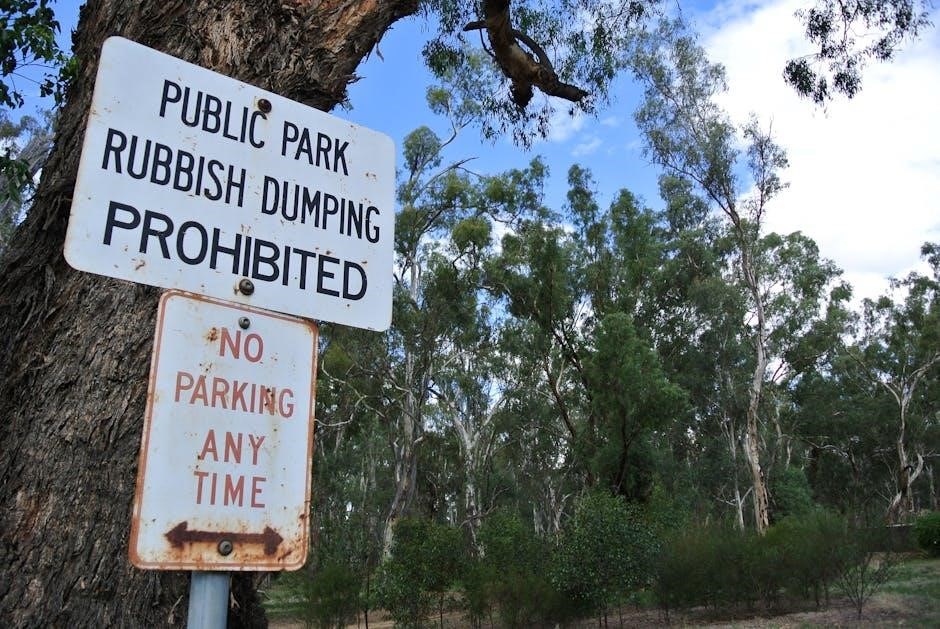Mobile home park rules and regulations govern community living, ensuring harmony and property value maintenance. These guidelines, often detailed in lease agreements or provided as PDF documents, outline expectations for residency, pet ownership, property upkeep, and management responsibilities. Understanding these rules is essential for residents to avoid conflicts and ensure a smooth living experience while adhering to local laws and park-specific policies.
Overview of Mobile Home Parks and Their Governance
Mobile home parks are planned communities offering affordable housing with shared amenities. Governed by specific rules and regulations, these parks are managed by entities responsible for maintaining infrastructure, enforcing policies, and ensuring compliance with local laws. Governance structures vary, but they typically involve park management or homeowner associations that oversee daily operations and resolve disputes. These systems aim to create a structured, harmonious living environment while balancing the needs of residents and management.
Importance of Understanding Park Rules for Residents
Understanding park rules is crucial for residents to maintain a harmonious living environment. These rules outline responsibilities, payment terms, and property standards, ensuring clarity and compliance. Familiarity with regulations helps residents avoid disputes and potential penalties, fostering a sense of community and accountability. Adhering to rules also protects property values and safety, making it essential for residents to review and understand all guidelines provided in official documents like the mobile home park rules and regulations PDF.
Lease Agreements and Rent Policies
Lease agreements outline financial obligations, payment terms, and rental durations, ensuring clarity for both residents and management. Rent policies detail due dates and acceptable payment methods.
Key Components of a Mobile Home Park Lease
A mobile home park lease must include essential elements such as rent amount, payment terms, and lease duration. It should outline resident responsibilities, property maintenance obligations, and rules for subleasing. Additionally, the lease will detail termination clauses, eviction processes, and dispute resolution mechanisms. Clear terms ensure both parties understand their obligations, helping prevent conflicts. Reviewing the lease thoroughly is crucial for residents to avoid misunderstandings and ensure compliance with park rules and local laws.
Rent Due Dates and Payment Terms
Rent due dates and payment terms are critical components of mobile home park leases. Typically, rent is due at the start of each month, with specific payment methods accepted, such as checks or online transfers. Late fees may apply if payments are delayed beyond the due date. Residents should review their lease for exact terms, including grace periods and penalties, to ensure timely payments and avoid disputes with management.

Residency Requirements and Occupancy Rules
Residency rules typically require owners to occupy the home, with immediate family allowed as occupants. Subleasing is often restricted or requires management approval, ensuring compliance with park policies.
Who Can Reside in a Mobile Home
Mobile home residency typically requires the owner to be the primary occupant. Immediate family members may also reside in the home, but subleasing is often prohibited unless approved by management. Rules ensure that only authorized individuals live in the home, maintaining community stability and compliance with park regulations. Violating occupancy terms can lead to residency termination or other enforcement actions by park authorities.
Rules Regarding Subleasing and Guest Policies
Subleasing is generally prohibited in mobile home parks unless explicitly approved by management. Guests may visit temporarily but must comply with park rules and management approval for extended stays. Unauthorized subleasing or long-term guest stays can violate lease terms, leading to enforcement actions. Parks often require prior approval for any non-resident overnight stays to maintain community order and safety, ensuring compliance with all applicable regulations and lease agreements.
Common Rules Found in Mobile Home Parks
Common rules include pet restrictions, quiet hours, parking limits, and property appearance standards. These guidelines ensure a safe, orderly, and visually appealing community environment for all residents.
Pet Policies and Restrictions
Pet policies vary by park but often include breed, size, and type restrictions. Exotic animals are typically prohibited. Residents must provide proof of vaccinations and licenses. Pets must be leashed in common areas, and owners are responsible for waste disposal. Noise and aggression issues may lead to enforcement actions. Failure to comply can result in warnings or even eviction. These rules aim to maintain safety and harmony within the community.
Property Maintenance and Exterior Appearance Standards
Property maintenance rules ensure uniformity and curb appeal. Residents must maintain lawns, trim trees, and keep exteriors clean. Unauthorized exterior modifications are prohibited. Decorative items and outdoor structures must meet park standards. Regular inspections enforce compliance, with violations addressed through notices. These standards protect property values and foster a visually cohesive community, ensuring a pleasant living environment for all residents while adhering to the park’s aesthetic guidelines and local regulations.

Role of Park Management
Park management oversees daily operations, maintains facilities, and enforces rules. They handle resident concerns, ensure compliance, and foster a safe, orderly community, addressing issues promptly for all residents.
Duties and Responsibilities of Park Management
Park management enforces rules, ensures lease compliance, and maintains property upkeep. They address resident concerns, mediate disputes, and uphold safety standards. Management also handles rent collection, facility maintenance, and rule enforcement, ensuring a well-organized community. They communicate policy changes and resolve issues promptly, fostering a positive living environment while adhering to legal requirements and park-specific regulations.
How to Address Concerns with Park Management
Residents should first review their lease agreement to understand management’s responsibilities and their own rights. Concerns can be addressed by contacting the park office directly, either in writing or in person, to discuss issues. Staying informed about state and local laws helps residents advocate for their rights effectively. Proactive communication and adherence to established procedures ensure concerns are resolved fairly and promptly, fostering a positive community environment.
Tenant Rights and Protections
Mobile home tenants are protected by legal safeguards, including anti-discrimination laws, eviction rights, and lease terms governed by state and local regulations ensuring fair treatment and fairness.
Legal Protections for Mobile Home Owners
Mobile home owners are protected under specific laws, such as the Mobilehome Residency Law, which safeguards against unjust evictions and ensures fair treatment. These protections prohibit discrimination based on race, gender, or disability and regulate lease terms. Residents also have rights to dispute resolution and legal recourse if park rules or management actions violate their protections. Familiarizing oneself with these laws is crucial to understanding and asserting one’s rights effectively.
Eviction Processes and Tenant Rights
Evictions in mobile home parks must follow legal processes, ensuring tenants receive proper notice and due process. Tenants typically have a period to address violations before eviction proceedings begin. Protections exist to prevent retaliatory evictions for exercising legal rights. Residents should consult local laws and legal resources to understand their rights and seek advice if facing eviction to ensure fair treatment and explore possible resolutions or appeals.
Subleasing and Transfer of Ownership
Subleasing and transferring ownership in mobile home parks are governed by specific rules to ensure compliance with lease agreements and legal standards, protecting both tenants and owners.
Rules Governing Subleasing Agreements
Subleasing in mobile home parks is often restricted or requires prior management approval. As of May 1st, 2022, subleasing to third parties is prohibited in many parks. Tenants must ensure compliance with lease terms, and sublessees are equally bound by park rules. Management approval is typically mandatory, and the original tenant remains responsible for rent and rule adherence. Violations can lead to legal action or eviction, emphasizing the importance of adhering to these regulations.
Process for Transferring Ownership of a Mobile Home
Transferring ownership of a mobile home involves legal and procedural steps. The home must be titled correctly, and ownership transfer often requires park management approval. The new owner must meet residency and financial requirements, and the transfer may involve updating lease agreements. Legal documentation, such as title transfer and notarized agreements, is necessary. Management may impose additional rules or fees, ensuring compliance with park regulations and local laws.
Enforcement of Rules and Regulations
Enforcement involves management monitoring compliance and addressing violations through penalties or legal action. Rules are upheld to maintain order and ensure a safe, fair environment for all residents.
Consequences of Violating Park Rules
Violating park rules can result in penalties, including fines or legal action. Repeat offenses may lead to lease termination or eviction. Residents may face loss of privileges or increased fees for non-compliance. Management enforces these measures to maintain community standards and ensure fair treatment for all residents, as outlined in the rules and regulations document provided to tenants.
Dispute Resolution Mechanisms
Disputes between residents and management are typically addressed through mediation or legal processes. Residents should review their lease agreements for specific resolution procedures. Many parks require written notices of issues, followed by mediation before escalating to court. Understanding local laws and tenant rights is crucial for resolving conflicts fairly. Proper documentation and communication are key to avoiding prolonged disputes and ensuring a harmonious community environment.

Amending and Updating Park Rules
Park rules are updated periodically to reflect changing needs or laws. Residents are typically notified of changes, ensuring transparency and fairness in governance.
How Rules and Regulations Can Be Modified
Modifications to mobile home park rules typically require approval from park management or the governing board. Changes are often proposed to adapt to new laws, address resident concerns, or improve community standards. The process usually involves drafting updated rules, reviewing them for legal compliance, and notifying residents. Any amendments must be communicated in writing, ensuring transparency and fairness for all parties involved.
Notifying Residents of Changes
Residents must be informed of any changes to mobile home park rules and regulations in writing. Notifications are typically provided via mail or email, ensuring transparency. The notice should detail the specific changes, the effective date, and reasoning behind the amendments. This process ensures residents are aware of their obligations and allows them to adapt accordingly, maintaining compliance with updated policies and fostering a well-informed community.

State and Local Laws Governing Mobile Home Parks
State and local laws regulate mobile home parks, ensuring compliance with safety, zoning, and tenancy standards. These laws vary by jurisdiction, providing frameworks for rent control, eviction processes, and resident protections. They often include specific provisions for mobile home owners, such as relocation rights and dispute resolution mechanisms, to balance the interests of residents and park owners while maintaining fair housing practices and community standards.
Variations in Laws by Jurisdiction
Laws governing mobile home parks vary significantly by state and locality, reflecting regional priorities and legal frameworks. For instance, California’s Mobilehome Parks Act provides robust tenant protections, while other states may have fewer restrictions. Local ordinances often address zoning, property taxes, and eviction processes differently. These variations mean residents and park owners must familiarize themselves with specific jurisdictional rules to ensure compliance and understand their rights and responsibilities within the legal landscape.
Key Legislation Protecting Residents
Key legislation, such as the Mobilehome Residency Law and the Manufactured Housing Act, safeguards residents’ rights. These laws often address eviction protections, rent control measures, and dispute resolution processes. They ensure fair treatment and prevent unjust practices by park owners. Residents are also protected against unlawful rule changes and retaliatory actions. Understanding these laws empowers residents to advocate for their rights and maintain a stable living environment within mobile home communities.
Understanding mobile home park rules and regulations is crucial for a harmonious living environment. Adhering to these guidelines ensures stability, fairness, and a positive community experience for all residents.
Final Thoughts on Adhering to Park Rules
Adhering to mobile home park rules is essential for maintaining a safe, orderly, and enjoyable community. Understanding and respecting these regulations ensures harmony among residents, protects property values, and fosters a positive living environment. By following the guidelines, residents contribute to the overall well-being of the community, while non-compliance can lead to conflicts or legal issues. It’s a shared responsibility to uphold these standards for everyone’s benefit.
Resources for Further Information
For additional guidance, residents and prospective tenants can consult state-specific housing agencies, legal aid organizations, or local government websites. Many states provide PDF guides outlining mobile home park rules and regulations. Legal resources like the Mobile Home Park Residency Law and Landlord-Tenant Act offer detailed insights. Local libraries and online forums also serve as valuable resources for understanding rights and obligations within mobile home communities.





